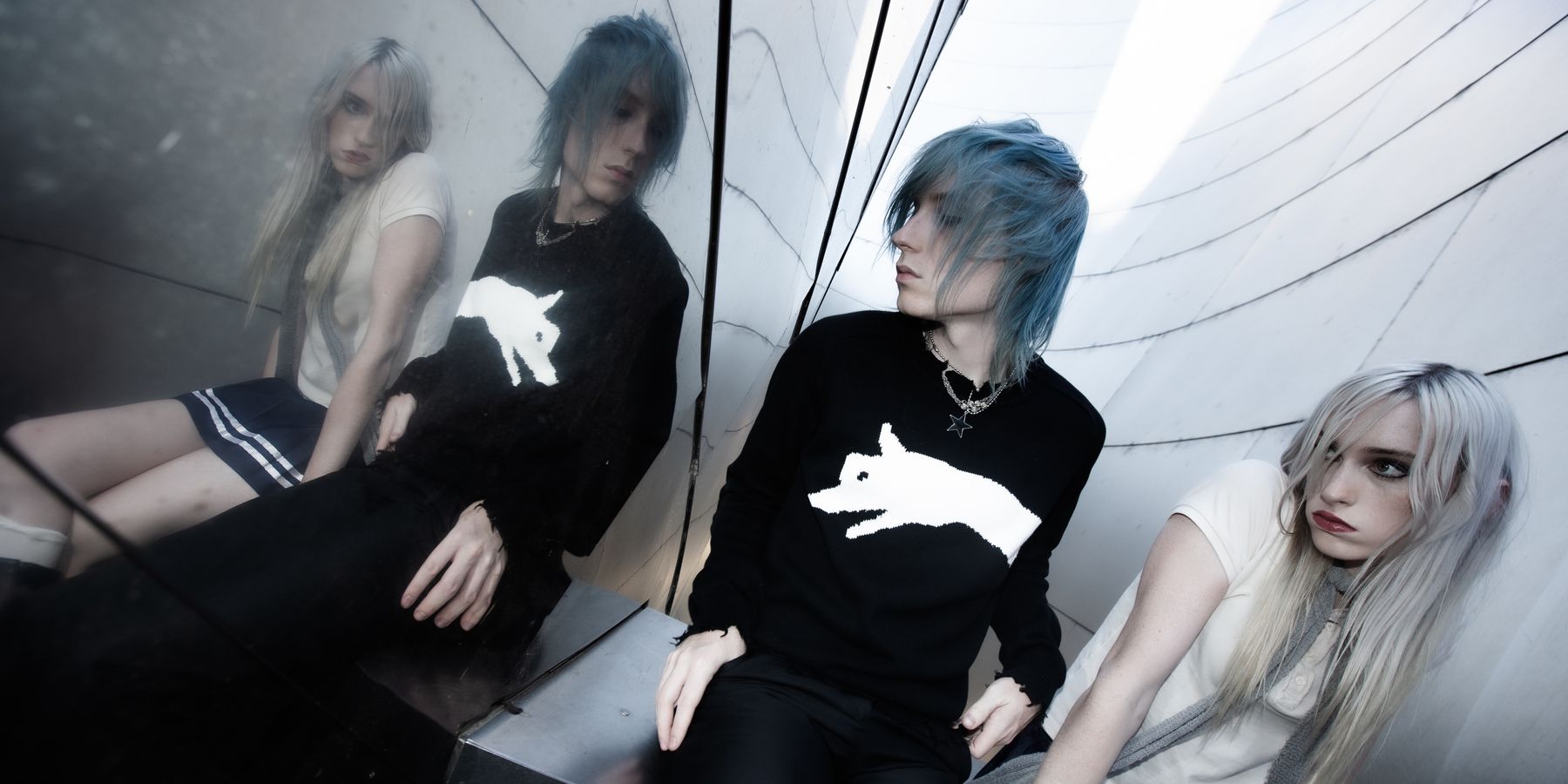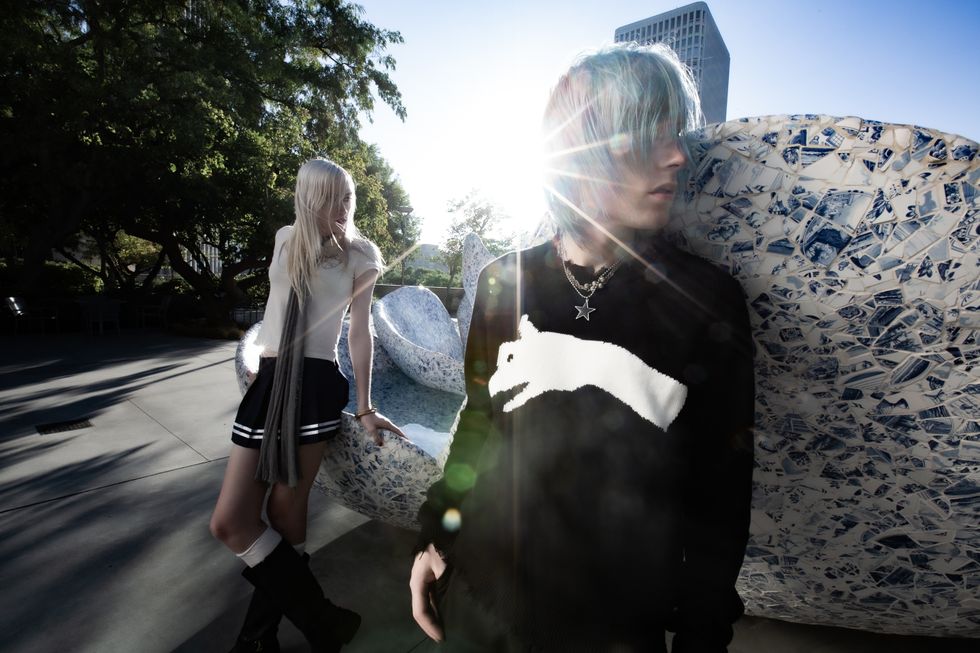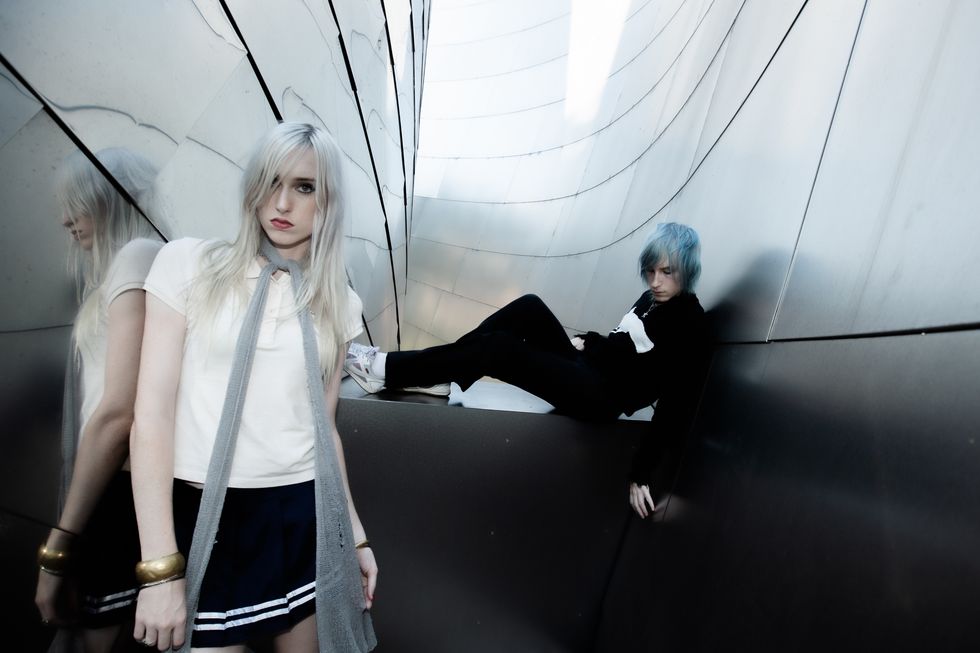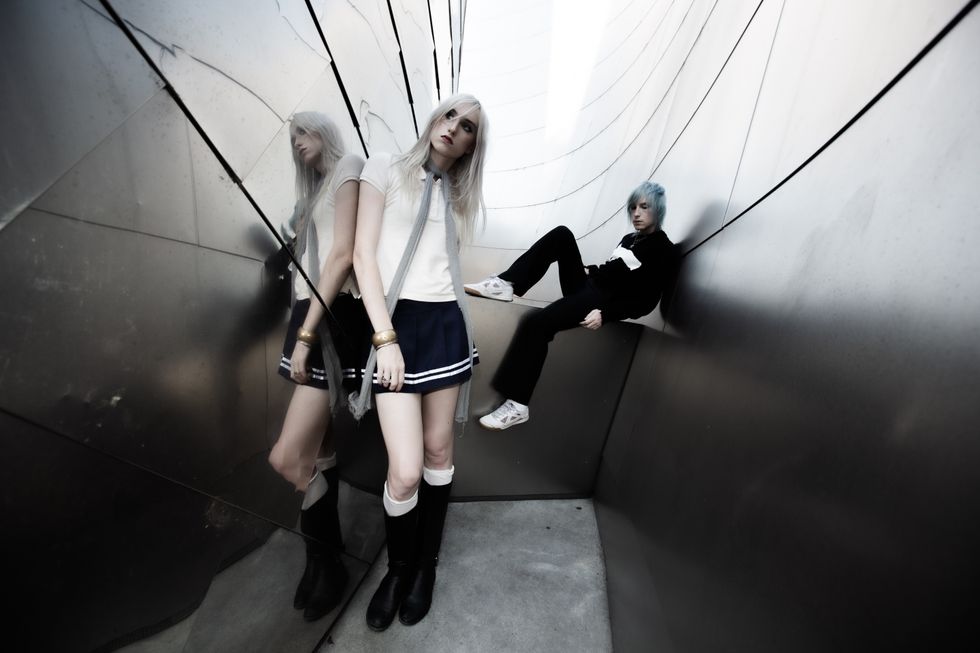
Frost Children Are in No Mood To Rest
BY
Tobias Hess | Sep 17, 2025

“Life is so long. There's so much time to rest and now is not the time,” Angel Prost of Frost Children tells PAPER with a grin.
It does seem as if the sibling duo, composed of Angel and Lulu Prost, have had little downtime since they came onto the scene in 2019, during the waning days of what the children were then calling “hyperpop.” Their sound was always destined to outlive that lukewarm genre descriptor, though.
Since the jump, Frost Children have had a thing that they do: their music is maximalist, intricate, always heavy on a gag, but also guided by an earnest familial spirit.In 2023, they released two albums on indie stalwart label, True Panther: SPEED RUN, a truer-to-form EDM, pedal to the metal sprint, and the cozier, more acoustic, Hearth Room (which we also talked about for PAPER).
Their newest album, SISTER (also out on True Panther), is a semi-synthesis of their previous releases, combining Hearth Room’s intent focus on songwriting and form with SPEED RUN’s computer-breaking production. “We ended [the double album release with] Hearth Room,” says Angel. “I love that album … but [if you discovered us after], that album isn’t painting the full picture [of our music]. So it was like, ‘We gotta get the full picture through a singular album now.’”

Per the duo’s intention, SISTER does feel like a thesis statement of sorts, an exploration of EDM, a genre which is heavy on both heart and lasers. They are aware of its reputation as somewhat low brow and ridiculous, but have a genuine fondness for its garish big swings. “There's an intrinsic humor to the genre,” shares Lulu. “We tend to lean more towards EDM that is a tad more in on the bit [and doesn’t take] itself too seriously.”
Angel spells out a spectrum of electronic music with “deep house” on one side, which she claims lacks some “humor,” and hyperpop on the other side, which she says, “sounds like shit and that's the joke.” SISTER then is Frost Children squaring that electronic sonic circle, detailed and earnest, but smilingly chaotic as well.
The album is quite the feat, especially given that it was made so soon after their “double release serve,” though they don’t seem to agree that making music is all that difficult. “I don't feel like making an album is as daunting of a task as people may make it out to be,” says Lulu. “In our experience, as long as you're always making music and [working on] ideas and songs, you'll have a lot of things to work with.”
Beyond their own music, they have a plethora of other projects bubbling up. They connected with Kim Petras and found a kindred pop spirit in her. Petras shows up on album highlight “Radio,” but the Frost Children have become deeply entwined in Petras’s music. They produced her recent single, ”Freak It.” “We just developed an awesome writing and creation space with each other,” says Lulu of their close partnership. “I think she understands the dynamic between beauty and sadness in the same way that we do,” Angel adds.
PAPER spoke with the duo about maintaining the creative spark, the humor of EDM and sharing their life as siblings and bandmates.
Hello! We meet again.
Angel: Years have passed. Babies have been born.
It’s all a blur, but the last interview we had was not that long ago. That said, you both are extremely prolific. Is that always your mode of creating?
Lulu: We've only gotten more [prolific]. You have to be high output if you have the passion for it. Anything can happen to you at any time, so you just have to do everything while you're in the mode. Whatever happens later in life, you can always look back and say, “Well, I have all of this music. I have all of these things that I've done.”
Angel: Life is so long. There's so much time to rest and now is not the time.

But it’s also incredibly difficult to make an album, and you don't strike me as people who are rushing out art. How are you maintaining a certain level of quality with this pace of output?
Angel: It's all in the edit of what you're making. SISTER is a 14-track album. When we made it, we thought it was going to be a 22-track album. We had 22 songs that we loved. We had so many demos and edited it down to have a certain vibe and be cohesive. You never have control over what the listener is going to think.
In the wake of the double serve of the last two albums, SPEED RUN and Hearth Room … we ended on Hearth Room. I love that album and I'm glad we made it, but [if you discovered us after], that album isn’t painting the full picture [of our music]. So it was like, “We gotta get the full picture through a singular album now.” We still took our time. We submitted these songs in March, which feels like a long time for me.
Lulu: I don't feel like making an album is as daunting of a task as people may make it out to be. In our experience, as long as you're always making music and [working on] ideas and songs, you'll have a lot of things to work with. Then you can say, “I feel like there's a trend going on [with this music] and maybe that's the album.” I zoom in a little bit and crop [the work] to figure out a visual or sonic language to tie it all together. But I’m not thinking about making an album when I'm making it, until the final steps to make sure all the things are seamless. But it’s a free expression. It’s not as scary as a lot of people may think. If you think about it too hard, you'll think, “I'm making an album. What do I do? Where do I start?” There shouldn't ever be a starting point. It’s a linear direction.
I guess there's many different ways to think about writing a song. One is that I'm creating a perfectly polished object that I labor over for months. And then another is something that’s in process and formed over time.
Lulu: I'm glad I'm not a writer or poet. I couldn't imagine being an author back in the typewriter days. You don't get to be as impulsive as you do now with art. I'm definitely glad to be making art in this era.
With the last double release, it felt like production was centered on one album and then songwriting on another. This one feels like synthesis.
Angel: We wanted songs to be at the center of [SISTER]. We wanted cohesive songs that you could arrange on a sheet of paper, but with a texture that is more interesting to us, which is EDM, Complextro, Bass Music. We wrote a lot of songs on guitar and then brought it over to the beats. It wasn’t super intentional. We wanted to make a focused thing for the first time. I think we hadn't really made a focused project, and I don't think all projects need to be focused, but this is our try at making something focused.
What are you defining as the focus on SISTER?
Angel: People always use the word “chaotic” with our music. I feel like there’s organized chaos with our music. We wanted SISTER to just be this really saturated, maximalist version of this dream world of EDM pop. If you listen to older music from us, it's always missing something or feeling thin. We want to be this really bassy, beefy, beautiful emotional thing that's for partying. It's fun and it's playful, and it's cool. It's not goofy, but there are moments that you can cry on the album. We ended up mixing the album ourselves because [it sounding beefy and bass] was a really important part of it. A big qualm that we have with a lot of dance music is like, “Oh if the bass was really loud here, this would be crazy.” That was the focus this time around.
Tell me about the mixing process?
Angel: All of my favorite artists have odd mixing choices. While we were making this album, I was listening to the Porter Robinson album, Worlds. There's like so many moments in that thing where it's in that album where the synth comes in over the top and it's so loud over the top. It's just like, “Whoa, like this is so insane. We'll probably be mixing ourselves as long as we're using computers. Maybe one day we’d do a studio album that's like all synthesizers and amplifiers, then maybe we would need a professional [mixer], but we're also kind of professional when you think about it.
Lulu: I do want to make an album at Abbey Road Studios one day.
Angel: Swaggy Road.

I’ve been puzzling over EDM. It has this beautiful earnestness, but also a goofiness. I sometimes wonder about that regarding your music … the line between irony and earnestness. You both strike me as earnest, genuine artists, but also the irony and jokes are always there.
Lulu: There's an intrinsic humor to the genre. We tend to lean more towards EDM that is a tad more in on the bit of not taking itself too seriously. We love EDM that has sounds that are really dumb sounding. When you bring it to the club, it doesn't sound dumb. People aren't like, “Oh that's a silly sound.” They’re more like, “Whoa, this beat is crazy.” They don't really know why necessarily, but it's just because it's different and simpler and less sophisticated than Fred Again type shit. No shade to that world of EDM, but it's highbrow in a way that maybe turns me off versus early Afrojack where it's just one little dumb Dutch house lead. It hits in the club more and excites people’s brains.
Angel: If there is any humor, it's maybe in the production of this album more so than lyrically. There’s this spectrum [in dance]. All these artists are making dance music with a lot of swung hats … it's like deep house. And then there's like capital-H Hyperpop on the other end. I don't really like either end because there has to be humor involved and that's why I don't like the left side of the spectrum. And then on the flip side it's the hyperpop shit, where it’s like, “This sounds like shit and that's the joke.” I never really liked that about hyperpop. [There’s music where there is] like a mockery of a bass sound, where you're only putting it in the song to be like, “This is stupid, right?” I don't feel that way. I genuinely am in love with these synths and these bass sounds, but I also get that they're not for everyone, and maybe that's part of the humor. One of my favorite genres is that kind of dance music where there's just one sound that's very out of place. Hudson Mohawk is great at that. It’s playful, it's dancey, it's kind of funny.
Have you had experiences, either when you were younger or since you've started touring, with the classic EDM thing?
Lulu: We went to Ultra Miami this past year. It was awesome. I was expecting it to be worse. I didn’t have the right context going, so I was skeptical. When we got there, it was amazing. People were going nuts. I don't feel like people even do crazy drugs anymore at festivals. Everyone was dancing and going crazy. People are just really happy to be there and ready to exist and be in that moment with a bunch of people and maybe not do drugs.
Angel: Part of me thinks that that's a minor problem. When we went to Ultra, the music was so great, the crowds were big and into the artists on stage. It's not like background noise, and it's a bit of an older crowd than I was expecting. There’s this gap in the EDM world where there's not a big swag factor yet. That might be a symptom of this sort of sober rave person … and that's awesome. I'm not knocking that at all. But a little bit of hedonism may be missing from the world of EDM right now, that I would love to see back.
On the songwriting level with this album, I take this record as a document of your life post-becoming full-time musicians.
Lulu: We wrote a lot of it together, before we did a lot of the actual EDM-fication of the songs. We wrote a good amount of them on guitar. Angel would come to me with a song that she wrote, or I would make a beat and then she would learn the chords of the beat on guitar. And then we’d stop playing the beat and write the song. We like to blend the two worlds, because we're focused on writing songs that stand the test of time. A song stripped to its most basic form has this sort of universal appeal larger than the genre.
Angel: We want to transcend sort of where we're at right now. The title track “Sister” is telling a story that we wrote with Avery Tucker. But besides that, we wanted to explore these feelings of heartbreak, like on “Blue Eyes,” or codependence, like on “Falling,” or there’s “Control” which explores familial relationships. These songs are exploring these dynamics because it is me and Lulu and like we live together, are best friends, and do all this shit together. Inevitably what we make is about that shared experience. We share a lot, so that's what came out.
Given that you share everything and so much of your life together, do you find moments for individual autonomy artistically or are you one organism?
Lulu: We are separate organisms.
Angel: I have a twerk side project. I make twerk step.
Lulu: I have a trancey side project. We have this organism that's larger than us, which is our label that we're starting right now called Purple Label. That’s for all of our other ideas outside of the albums, and the Frost Children universe of albums and stuff.
Angel: We've also been collaborating with other artists, both as Frost Children and producing for other people. We're doing a bunch of stuff for Angel Money and then like the shit with Kim Petras, of course.
The Kim Petras stuff has been really exciting and it makes perfect sense. How did that come about?
Angel: She reached out and wanted to work. I was like, “Hell yes, next time we're in LA.” Then we came out and had scheduled 2 sessions. It just kept becoming more and more and more and becoming a lot of songs.
Lulu: We're still working on music now too, which is continuous for whatever is in the future. We just developed an awesome writing and creation space with each other. It's really easy to make shit as the three of us, and then with this these people Nick Weiss (nightfeelings) and Margot XS were in the room helping us with the album the whole time. That that whole squad is awesome.
How would you describe what you share in common with Kim?
Angel: I think she understands the dynamic between beauty and sadness in the same way that we do.
Lulu: We speak a very similar language with music.
Angel: The language is escapist a lot of the time. All three of us — me, Lulu, and Kim — are very locked in on making fake stories in songwriting and not drawing 100% from personal experience. We've always been attracted to artists that are able to take emotions … they have real life experiences, they have emotions, and then they make a new story out of that emotion to demonstrate that. That is preferred over, “Here's my life on paper.” I've never been as much of a fan of that. It works for some people, but it would make me uncomfortable to write my life as it exactly is into a song. We share that in common too, which I think is really special.
Photography: David Milan Kelley